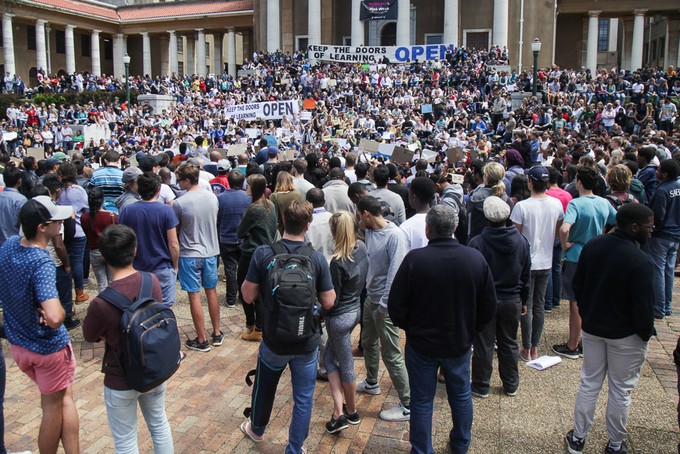Keep universities open
Consequences of a shutdown will be terrible
Our tertiary institutions face the threat of having to cancel the academic year. Classes resume on Monday at the University of Cape Town (UCT) and some student protesters are intent on preventing that from happening. If UCT cannot assure the safety of its staff and student body, it will effectively close for the remainder of the year. Wits, UJ, UKZN, Fort Hare and many other institutions are in a similar position.
It will be very serious if this happens. Here are some likely outcomes:
-
There will be no intake of community service doctors because none will graduate. The effect of this will probably never be properly measured, but it will almost certainly result in many lives lost especially in impoverished rural parts of the country, where patients will receive even worse medical care than usual.
-
Universities will not be able to charge full fees to students affected by the cancellation because the institutions would not have fulfilled their contracts to provide a full year’s education. This will mean less money to pay staff, with likely retrenchments to follow.
-
Every additional day at university costs students more money. At best for many students their graduation will be postponed by months, if not a full year. Poorest students will be hit hardest by this. Students whose loans only cover them until the end of the academic year face the possibility that they might never be able to graduate. Delays in graduation will mean delays in young people getting jobs and being able to earn money, impacting on their family’s livelihoods.
-
University administrations will become overburdened trying to manage the logistics of a cancelled year. Mistakes will be made, leaving students angrier and resulting in even more conflict.
-
Wealthier families will send their children to universities outside the country, leaving tertiary education with even less funding.
-
International students who have been greatly enriching institutions like UCT over the past decade will be less likely to come here.
Students have a right to protest. They have raised issues of vital public interest and highlighted many of our society’s wrongs. Universities should respect their right to protest, and they should continuously engage with protesting students. We need a country-wide plan to make university education more affordable for low- and middle-income households. But protesters do not have a right to disrupt classes, intimidate students, destroy university property or use violence.
The universities have a duty to protect students who wish to complete the academic year. As we have seen over the past week this isn’t easy. Our reports have shown that both the police and private security are poorly trained. They have often responded abysmally: security throwing stones at students, or police shooting rubber bullets unnecessarily at protesters who present no immediate threat to anyone.
All options should be pursued by university management to avoid conflict. But we have reached a point where some universities have no choice but to deploy security to protect students, staff and infrastructure from violence.
Next: NMMU students canvass support in the streets of PE
Previous: Standoff between management and student protesters at DUT
Letters
Dear Editor
I suggest: Close every single one of the 26 institutions of higher learning for the year right now. Lift every interdict, terminate every disciplinary proceeding (pending or closed), and then, maybe, just maybe, the hundreds of thousands of innocent students and their parents, and the ANC, and the public at large, will get it into their heads what incalculable damage has been done to the entire country.
© 2016 GroundUp. 
This article is licensed under a Creative Commons Attribution-NoDerivatives 4.0 International License.
You may republish this article, so long as you credit the authors and GroundUp, and do not change the text. Please include a link back to the original article.



